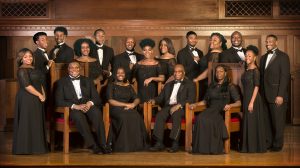The Fisk Jubilee Singers will join the Ole Miss Choir in celebration of Black History Month on Thursday at the Gertrude Ford Center.
This will be the Fisk Jubilee Singers’ first time performing at Ole Miss in the group’s 147-year history.
“Fisk – to me, they are like the kings and queens of an HBCU,” said Anitria Jones, one of the choir members performing with the singers. “You have to be top notch to get into there. You have to know what you know and be sure about it. You have to be proud of where you come from, and you have to be willing to educate somebody else about your past.”
The Fisk Jubilee Singers are composed of students from Fisk University in Nashville, Tennessee. The school was founded for the education of freedmen in 1866 and became a teacher’s college in 1867.
 In 1871, the school entered financial trouble which resulted in concert tours across the country with some of its students as a fundraising effort.
In 1871, the school entered financial trouble which resulted in concert tours across the country with some of its students as a fundraising effort.
Initially, the efforts were in vain, as the audiences didn’t like the songs the choir sang. It was eventually suggested that they should sing the Negro spirituals that told their stories.
Negro spirituals are closely related to slavery in the American South and are now regarded as one of the largest forms of American folk music.
“There is a lot more understanding that you have to obtain in order to sing the music, because if you don’t, it won’t come out right and the interpretations will be wrong and the people who you’re singing it to, it’s just like another song to them instead of it being a message,” Jones said.
JoAnndria Brown, UM NAACP president, said church is greatly influenced by these spirituals.
“Many hymns in the African-American church are formatted as call and response, which are similar to the songs that slaves would sing while they worked,” she said. “Numerous Negro spirituals describe the many trials and tribulations that we face today.”
It is said that Negro spirituals were used as codes to inform other enslaved people that they were planning to escape. A known coded song was “Go Down Moses” used by Harriet Tubman to make herself known to slaves who might want to escape north.
“Negro spirituals emerged out of the agony of slavery,” said George Dor of the School of Music.
In the 1950s and 1960s, spirituals were used as an instrument of protest during the civil rights movement. “Freedom songs” at the time, such as “Oh, Freedom” and “Eyes on the Prize,” came from old spirituals.
“The influence of spirituals is far-reaching,” Dor said. “It can have its influence seen in blues, rock ‘n’ roll and country music.”
The Fisk Jubilee Singers were the first group to arrange spirituals in a professional manner. Since the original fundraising trip, the singers have played before European royalty, such as Queen Victoria.
The singers’ performance at the Ford Center will feature musicians from the university onstage with the Fisk singers and a dance from the African Drum and Dance Ensemble.
“It’s an honor. It’s something that you dream about. It’s like an actress receiving a Tony,” Jones said. “It’s something so special, and after it’s over, I’ll probably cry because I’m going to want to go back with them because they are just amazing.”
There will be a short lecture on the history of the Fisk Jubilee Singers along with a question-and-answer period at noon Thursday at Nutt Auditorium with musical director Paul Kwami.
This article was submitted to The Daily Mississippian from an advanced reporting class.






